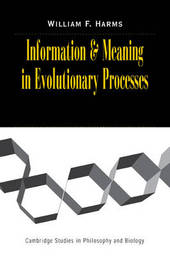
|
Information and Meaning in Evolutionary Processes
Paperback / softback
Main Details
| Title |
Information and Meaning in Evolutionary Processes
|
| Authors and Contributors |
By (author) William F. Harms
|
| Series | Cambridge Studies in Philosophy and Biology |
|---|
| Physical Properties |
| Format:Paperback / softback | | Pages:284 | | Dimensions(mm): Height 228,Width 152 |
|
| Category/Genre | Philosophy - epistemology and theory of knowledge
Philosophy of science |
|---|
| ISBN/Barcode |
9780521039215
|
| Classifications | Dewey:501 121 121 |
|---|
| Audience | | Professional & Vocational | |
|---|
| Illustrations |
8 Tables, unspecified; 34 Line drawings, unspecified
|
|
Publishing Details |
| Publisher |
Cambridge University Press
|
| Imprint |
Cambridge University Press
|
| Publication Date |
16 August 2007 |
| Publication Country |
United Kingdom
|
Description
This book is intended to help transform epistemology - the traditional study of knowledge - into a rigorous discipline by removing conceptual roadblocks and developing formal tools required for a fully naturalized epistemology. The evolutionary approach which Harms favours begins with the common observation that if our senses and reasoning were not reliable, then natural selection would have eliminated them long ago. The challenge for some time has been how to transform these informal musings about evolutionary epistemology into a rigorous theoretical discipline capable of complementing current scientific studies of the evolution of cognition with a philosophically defensible account of meaning and justification.
Reviews'I strongly recommend this book for anyone interested in pursuing the development of a biologically based naturalistic account of knowledge and the evolution of cognitive mechanisms. It is not an easy read but will more than repay the careful reader with suggestive insights and, I believe, a unique slant on the host of problems that we have inherited from the work of Donald Campbell.' Michael Bradie, Bowling Green State University 'This book contains original insights about information transmission and the evolution of meaning. After you read Part III the is/ought question will never look the same.' Brian Skyrms, University of California, Irvine
|